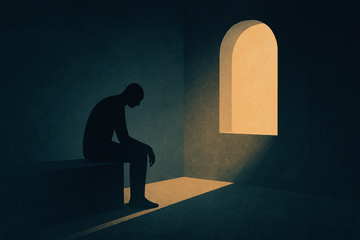We live in a world that never stops talking. Noise has become the background hum of our lives—notifications, conversations, advertisements, music, traffic, chatter, distraction. And when all of it suddenly falls quiet, we often feel an unease we can’t fully explain.
Silence can feel uncomfortable, even threatening. But why? And what does that discomfort reveal about who we are?
This is not just about sound. It’s about the space inside us that silence exposes. And if we are willing to sit with it, silence might be the very thing that teaches us what we’ve been running from all along.
The Hidden Fear Behind Silence
When the world goes quiet, many of us feel restless. We reach for our phones. We put on music. We fill the air with words. Anything but silence.
That fear isn’t really about quiet itself. It’s about what silence brings up:
-
The unresolved thoughts we’ve been avoiding.
-
The emotions that surface when nothing is distracting us.
-
The realization of how often we rely on noise to drown out our inner world.
Silence doesn’t create fear—it reveals it. And most of us haven’t been taught how to sit with that kind of vulnerability.
What Silence Reveals About the Self
Silence is like a mirror. It reflects back what’s actually happening within us, whether we want to see it or not.
In quiet moments, we might notice:
-
The way our mind races with unfinished conversations.
-
The anxiety that creeps in when there’s nothing to do.
-
The deep hunger for meaning beneath our constant busyness.
This is why silence feels heavy. It doesn’t flatter us, it confronts us. It shows us the truth of our own state of being—our unrest, our longing, our unresolved pain.
But that confrontation is also an invitation. Because what we notice in silence is what we most need to understand in ourselves.
Learning to Sit With Silence
Silence isn’t meant to be fought or feared. It’s meant to be faced.
If you let it, silence can become a teacher. But like any teacher, it demands honesty. You can’t fake stillness. You can’t escape what rises in the quiet. You can only decide whether to keep running or to finally stop and listen.
Here are a few ways to let silence become a practice instead of a punishment:
Start small.
Take a few minutes each day without devices, music, or background noise. Let your mind settle without distraction.
Notice your reactions.
When restlessness or discomfort appears, observe it instead of resisting it. Ask yourself, “What am I trying to avoid right now?”
Breathe into the space.
Silence is not emptiness. It’s a space where you can breathe, release tension, and simply exist.
Let the truth rise.
Often, the emotions or thoughts that surface in silence are the ones we most need to face. Don’t judge them—just notice them.
Over time, silence becomes less of an enemy and more of a grounding presence.
The Gift Hidden in Silence
Silence, once feared, often becomes the very thing we crave.
Because in silence:
-
We find clarity that endless noise can never give us.
-
We remember that peace is not something to chase—it’s something we uncover.
-
We reconnect with the depth inside us that the world constantly tries to flatten.
The more we allow ourselves to enter silence, the less afraid we become of being alone with ourselves. And that’s where real strength begins.
Why Embracing Silence Matters Today
In a culture that glorifies speed, distraction, and constant output, silence is almost revolutionary. It resists the pressure to always be “on.” It gives us back the power to hear our own thoughts in a world that is always telling us what to think.
Most importantly, silence reminds us that we are more than what we consume, produce, or perform. We are human beings, not just human doings.
Choosing silence is choosing depth over noise, clarity over confusion, and truth over distraction. And in a time where everyone is searching for meaning, silence might be the most radical teacher we have left.
A Short FAQ on Silence
Is silence the same as meditation?
Not exactly. Meditation is a structured practice. Silence can be as simple as turning everything off and sitting with yourself. Both can overlap, but silence itself doesn’t require technique—it only requires willingness.
Why does silence make me anxious?
Because it removes distractions and exposes what’s beneath the surface. That discomfort is not a sign of weakness—it’s a sign that you’ve uncovered something real.
How much silence should I practice?
Start where you are. Even 5 minutes of intentional quiet each day can shift your relationship with yourself.
A Closing Thought from Benevolentia
Silence is not empty. It is full—of truth, of reflection, of everything we’ve been too busy to face. And while it may feel uncomfortable at first, it holds the possibility of the very peace we’re searching for.
Don’t fear silence. Step into it. Listen to it. Let it remind you of who you really are beneath the noise.
- Benevolentia ✨






